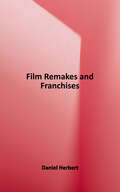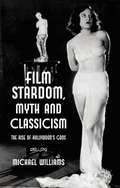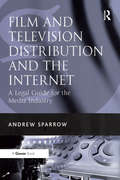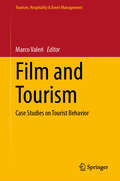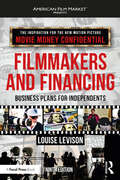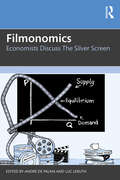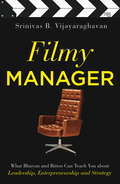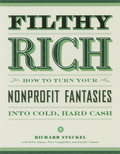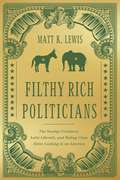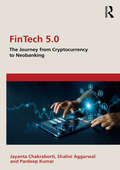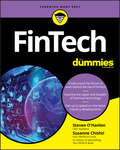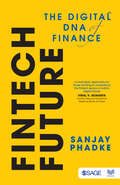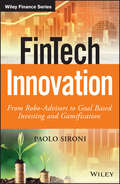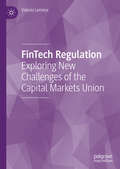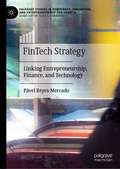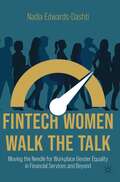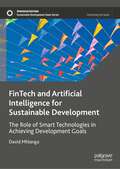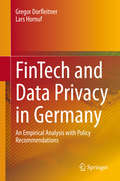- Table View
- List View
Film Policy: International, National and Regional Perspectives (Culture: Policy and Politics)
by Albert MoranFilm Policy is the first comprehensive overview of the workings of the international film industry. The authors examine film cultures and film policy across the world, explaining why Hollywood cinema dominates the global film market, and the effects of the rise of television and video on the international industry. In a series of case studies drawn from North America, Europe, Latin America, Asia and Australia, the authors explore the relationship between Hollywood cinema product and national film cultures, and trace the development of international and national film policies, looking at issues of financing, regulation, protectionism and censorship.
Film Remakes and Franchises (Quick Takes: Movies and Popular Culture)
by Daniel HerbertContemporary media seems incredibly unoriginal, as Hollywood produces an endless flood of remakes, sequels, reboots, and franchises. We watch as the same stories, characters, and images appear again and again in different films, on new platforms, and as toys and other merchandise. Are these works simply crass commercial products, utterly devoid of creativity, or do they offer filmmakers a unique opportunity to reimagine iconic characters and modern myths? <p><p>Film Remakes and Franchises examines how remakes and sequels have been central to the film industry from its very inception, yet also considers how the recent trends toward reboots and transmedia franchises depart from those historical precedents. Film scholar Daniel Herbert not only analyzes the film industry's increasing reliance on recycled product but also asks why audiences are currently so drawn to such movies. In addition, he explores how contemporary filmmakers have used reboots and franchise movies to inject timely social commentary and diversity into established media properties. <p><p>A lively and accessible overview that covers everything from You've Got Mail to The Force Awakens, Film Remakes and Franchises raises essential questions about the intersection of business and creativity in Hollywood today.
Film Stardom, Myth and Classicism
by Michael WilliamsSince the golden era of silent movies, stars have been described as screen gods, goddesses and idols. This is the story of how Olympus moved to Hollywood to divinise stars as Apollos and Venuses for the modern age, and defined a model of stardom that is still with us today.
Film Stars and Gurus: Soft Power in Bollywood and Beyond
by Tarun Khanna Willy Shih Margaret PiersonThis chapter looks at how soft power-which arises from the appeal of a country's cultural and political practices-has won global influence for India, through the popularity of its film industry, international expansion by individual companies, and the soaring presence of yoga in the West, among other things.
Film and Television Distribution and the Internet: A Legal Guide for the Media Industry
by Andrew SparrowThere is no area of business that is more dramatically affected by the explosion of web-based services delivered to computers, PDAs and mobile phones than the film and television industries. The web is creating radical new ways of marketing and delivering television and film content; one that draws in not simply traditional broadcasters and producers but a whole new range of organizations such as news organizations, web companies and mobile phone service providers. This companion volume to Andrew Sparrow's Music Distribution and the Internet: A Legal Guide for the Music Business focuses on the practical application of UK and EU law as it applies to the distribution of television and film through the internet. This includes terms of contract and copyright as they affect studios, broadcasters, sales agents, distributors, internet service providers, film financiers, and online film retailers; as well as areas such as the licensing of rights. It also covers the commercial aspects of delivering film and television services to a customer base, including engaging with new content platforms, strategic agreements with content aggregators, protecting and exploiting intellectual property rights, data and consumer protection, and payment, online marketing and advertising. The opportunities for companies operating in this area are extraordinary (as are the legal implications) and Andrew Sparrow's highly practical guide provides an excellent starting point for navigating through what is a complex area of regulation, contract, copyright and consumer law.
Film and Tourism: Case Studies on Tourist Behavior (Tourism, Hospitality & Event Management)
by Marco ValeriFilm tourism has emerged as a major driver of tourism development for many destinations. To date, there has been substantial literature on the subject, but little of it has engaged with the wider social science paradigm of culture, film and media research. The intellectual components of film tourism as an area of academic inquiry span several academic subjects such as marketing, economics, finance, psychology, social development, sustainability, and operations. Film is a relatively obscure area of tourism research, but the wider interconnections between tourism, space and media are beginning to be explored and understood. The interest which the topic has generated highlights this subject as one that is worthy of attention within both the academic community and in a practitioner context. The contributions in this book discuss the debates about the perceived and actual impact of film tourism and what must still be learned about this phenomenon to create the most unique and satisfying visitor experiences and protect the communities and environments that it affects. Fundamental questions are raised regarding the real demand for and draw of film as a tourism motivator, and the range of assumptions, conflicts, and contradictions that underlie them.
Film-Herstellungsleitung: Eine Einführung in die Praxis
by Fabian PostDas Buch betrachtet alle kaufmännische relevanten Themen im Rahmen einer professionellen Spielfilm-und Serienproduktion und erläutert dieseanhand von Praxisbeispielen. Nach theoretischer Betrachtung der Themen -und einigen Anekdoten des Autors aus der Praxis- nimmt dieser den Leser an die Hand und durchläuft mit ihm gemeinsam ein fiktives Filmprojekt mit dem Titel „Mord in Studio 1“. Von der ersten Idee, über die Projektentwicklung und die Dreharbeiten hinaus, bis hin zur finalen Ablieferung des Sendebands an den TV Sender wird der Leser im Rahmen von „Mord in Studio 1“ in das Handwerk der kaufmännischen Filmproduktion durch einen erfahrenen Herstellungsleiter eingeführt.
Film-Induced Tourism
by Sue BeetonFilm-induced tourism has the potential to revitalise flagging regional/rural communities and increase tourism to urban centres, however it carries with it its own unique problems. This publication explores such elements, delving into the disciplines of sociology and psychology, along with the fields of destination marketing, community development and strategic planning.
Film-Induced Tourism: 2nd edition
by Sue BeetonThis research-based monograph presents an introduction to the concept of film-induced tourism, building on the work of the seminal first edition. Many new case studies exploring the relationship between film and TV and tourism have been added and existing cases have been updated. The book incorporates studies on film studio theme parks, the impact of film-induced tourism on communities and the effect of film on tourists' behaviour. It introduces new content including film-induced tourism in non-Western cultures, movie tours and contents tourism. The book is an essential resource for postgraduate students and researchers in the fields of tourism, film and media studies.
Filmmakers and Financing: Business Plans for Independents (American Film Market Presents)
by Louise LevisonThis updated ninth edition of Louise Levison’s ultimate filmmaker’s guide provides easy-to-follow steps for writing an investor-winning business plan for independent films. This new edition includes information on current distribution models and the evolving digital streaming service landscape. Updated examples and references solidify this edition as the go-to source for creating a successful film business plan. Complete with comprehensive explanations on how to write each of the eight sections of a business plan; a complete sample plan for reference; and a companion website with additional information and financial tables, this book gives readers the tools needed to secure financing for a film. Essential reading for students and professionals alike, this book is ideal for anyone looking to further their understanding of film financing and how to create a successful business plan.
Filmonomics: Economists Discuss the Silver Screen
by André de Palma and Luc LeruthWhat could movies as diverse as The Last Samurai, Cléo from 5 to 7, or Dr. Strangelove have in common? Filmonomics has a simple yet intriguing answer: economics as the main driving force of the plot or as the main motivation of the characters’ actions.This book analyses how movie makers use economic and financial motives in their plots or to build their characters. Have they done it in line with economic theory? Or are they proposing a new angle, a new perspective, that economists should take note of? The authors here do not discuss wages in the film industry or the economics of movies. What interests them is the economic motivations underpinning the behaviour of fictional characters in their favourite films. They argue that credible movie characters can behave in irrational ways, and movie makers occasionally introduce new ideas that economists should take note of.A unique contribution, this book will be of interest to readers eager to discover what economists have to say about films and film directors. It will be indispensable for students and researchers of economics, media studies, film studies, and cultural studies.
Filmy Manager
by Srinivas B. VijayaraghavanBusiness number nahin, business log hain...sirf log.’(‘Business is not about numbers, business is about people...just people.’) – HARPREET SINGH BEDI in Rocket Singh: Salesman of the Year Hindi cinema is known the world over for its glamour and bling, but did you know that Bollywood can also teach you valuable management lessons? Viewing essential business principles through a colourful cinematic lens, Filmy Manager presents a unique and compelling take on leadership, strategy, organizational behaviour and entrepreneurship – four essential qualities for successful management. In Lagaan, a brave villager rallies an entire community to defeat the colonizing British at their own game; in Band Baaja Baaraat, an enterprising duo bootstrap their wedding planning firm; in Rocket Singh: Salesman of the Year, a young man in a thankless job displays his intrepid spirit and strikes out on his own; and in Guru, the entrepreneurial initiative of one man changes how India defines profitability. At once practical and entertaining, Filmy Manager collects sharp and astute management wisdom from the unlikely world of Hindi cinema that will keep readers engaged right through.
Filthy Rich
by Robin Simons Richard Steckel Peter LengsfelderWhen FILTHY RICH was first published in 1989, there were close to one million nonprofit organizations competing for cash to fund projects. Today, that number has more than doubled, and the competition for funding is as fierce as ever. While nonprofits' philanthropical outlook may distinguish them from their for-profit counterparts, they still have to keep an eye on the bottom line if they are to keep their projects funded and successful. In this revised and updated guide to running a nonprofit, Dr. Richard Steckel explains that, just like the most visionary venture capitalist, nonprofits must channel their dreams of grandeur into a goal-oriented, entrepreneurial organization. Follow Dr. Steckel's realistic, step-by-step plan to develop a strong vision, get your message heard, and make money to keep your nonprofit alive!From the Trade Paperback edition.
Filthy Rich Politicians: The Swamp Creatures, Latte Liberals, and Ruling-Class Elites Cashing in on America
by Matt LewisFrom one of America's sharpest political journalists is this searing, thought-provoking and hilarious takedown of the ruling class running amok in Washington. These are your elected officials. Some are slyly taking advantage of the system. They are hoping no one is savvy enough to notice. But Matt Lewis has. And this is what he&’s learned. Today&’s politicians are an unsavory lot—a hybrid of plutocrats and hypocrites. And it&’s worse (and more laughable) than you can imagine. Lewis will introduce you to a crop of latte liberals, ivy league populists, insider traders, trust-fund babies, and swamp creatures as he exposes how truly ludicrous money in politics has gotten. In Filthy Rich Politicians, Lewis embarks on an investigative deep dive into the ridiculous state of modern American democracy—a system where the rich get elected and the elected get rich. One of the brightest conservative writers of his generation, Lewis doesn&’t just complain: he articulates how Americans can achieve accountability from their elected leaders through radically commonsense reforms. But many of these ruling-class elites have a vested financial interest in rejecting the reforms so desperately needed to rebuild Americans&’ trust in the institutions that once made our nation great. This is not an &“eat the rich&” kind of book, and it is not for those who want to stoke class warfare, topple the whole regime, and burn it all to the ground. This is a must-read book for thoughtful readers who yearn for transparency and will commit to holding their elected leaders accountable to those they are supposed to represent—we the people. The reforms spelled out in this book would incentivize good behavior in our leaders, stymie corruption, and prevent politicians from using the system (and our taxpayer dollars) to feather their filthy rich nests. It is only by taking these steps to reform the system that we can rebuild trust in our institutions and preserve American democracy for future generations. There really is no richer inheritance we could leave them.
FinTech 5.0: The Journey from Cryptocurrency to Neobanking
by Shalini Aggarwal Jayanta Chakraborti Pardeep KumarThis book offers comprehensive knowledge on, and the applications of, the rapidly evolving financial technology landscape. Authored by seasoned experts, it serves as a vital resource for both students and practitioners in the fintech sector.Covering the evolution of cryptocurrencies to the rise of Neobanks and Central Bank Digital Currencies (CBDCs), this volume delves into critical topics such as blockchain, PayTech, LendTech, WealthTech, InsurTech, RegTech and artificial intelligence in finance. It also provides insights into Neobanking and CBDC. Each chapter details the latest trends, challenges, and regulatory frameworks shaping the industry, along with examples and illustrative case studies.Students will benefit from the structured approach that facilitates understanding complex concepts, while practitioners will find real-world applications, case studies, and strategic insights to enhance their professional practices. With a focus on innovation and technology, this book not only prepares readers for the future of finance but also equips them with the tools to navigate and thrive in this dynamic environment. This unique volume is an essential guide to understanding and leveraging fintech advancements, for beginners and experts alike.
FinTech For Dummies
by Susanne Chishti Steven O'Hanlon Brendan Bradley James Jockle Dawn PatrickThis comprehensive, hands-on guide is the go-to source for everything you need to confidently navigate the ever-changing scene of this booming industry. FinTech For Dummies will shed light on this rapidly changing landscape making it an invaluable source of information for anybody working in or interested in this space. This book provides insights, knowledge and guidance from industry experts Steve O’Hanlan and Susanne Chishti on the following: Gaining insight fastest growing market segment of the financial markets Learning the core decision making to effect a growth plan Securing knowledge of the fastest growing fintech companies in the world Navigating the fintech world The ingredients into building a FinTech company
FinTech Future: The Digital DNA of Finance
by Sanjay PhadkeFintech is challenging banks and squeezing all our financial transactions onto a mobile screen! Should we be worried? We make payments via PayPal or Paytm, shop on Amazon or Flipkart, book accommodation on Airbnb or Oyo and call a cab using Uber or Ola apps. The big tech companies are taking care of all our finances virtually while new technologies such as artificial intelligence (AI), internet of things (IoT), blockchain, big data, 5G and quantum computing promise to raise a new storm in the future of finance. Fintech Future is the story of technology disrupting finance—from coin to bitcoin, banknote to cloud and stodgy old banks to AI—viewed from the perspective of whether it helps make the world a better place.
FinTech Hive at DIFC: Creating a Fintech Ecosystem in Dubai
by Gamze Yucaoglu Marco Di MaggioThe case opens in 2019 as Raja Al Mazrouei, executive vice president of FinTech Hive (the Hive) at the Dubai International Financial Centre (DIFC), the first and largest financial technology accelerator in the Middle East, Africa and South Asia region, contemplates her and the Hive's option to support the fintech ecosystem in Dubai as the accelerated startups face funding challenges in the market. The case chronicles Al Mazrouei's efforts to set up the Hive in 2016 to create a fintech ecosystem in the region in line with the Kingdom's National Agenda to help financial institutions engage with technology to remain relevant to the region's evolving customer and market needs. The case provides a detailed overview of the model the Hive was based on and its growth story that led the Hive to rank as the 10th largest Global Fintech Hub and the 3rd biggest Global Islamic Fintech Hub in 2019. Having successfully "graduated" two classes of startups, in 2019 the Hive had signed partnerships with accelerators and incubators around the world and had announced a $100 million dedicated fund to support fintech companies globally. Yet, Al Mazrouei knew that she had just scratched the surface and there was a lot to be done. The investment mentality in the region was still quite conservative, and there were only a few venture capital funds and angel investors were virtually non-existent. The continued success of the startups depended on their access to funding and Al Mazrouei was concerned about the Hive's ability to support the increasing number of fintech startups the Hive had lured to Dubai. One such startup that had successfully graduated from the Hive's 2018 accelerator program was in the market raising funds. Would they succeed? Would the Hive's funds be enough to encourage VCs, financial institutions, and angel investors to join in and invest in early-stage fintech startups to keep them going?
FinTech Innovation: From Robo-Advisors to Goal Based Investing and Gamification (The Wiley Finance Series)
by Paolo SironiA survival guide for the FinTech era of banking FinTech Innovation examines the rise of financial technology and its growing impact on the global banking industry. Wealth managers are standing at the epicenter of a tectonic shift, as the balance of power between offering and demand undergoes a dramatic upheaval. Regulators are pushing toward a 'constrained offering' norm while private clients and independent advisors demand a more proactive role; practitioners need examine this banking evolution in detail to understand the mechanisms at work. This book presents analysis of the current shift and offers clear insight into what happens when established economic interests collide with social transformation. Business models are changing in profound ways, and the impact reaches further than many expect; the democratization of banking is revolutionizing the wealth management industry toward more efficient and client-centric advisory processes, and keeping pace with these changes has become a survival skill for financial advisors around the world. Social media, big data analytics and digital technology are disrupting the banking industry, which many have taken for granted as set in stone. This book shatters that assumption by illustrating the massive changes already underway, and provides thought leader insight into the changes yet to come. Examine the depth and breadth of financial technology Learn how regulations are driving changing business models Discover why investors may become the price-makers Understand the forces at work behind the rise of FinTech Information asymmetry has dominated the banking industry for centuries, keeping the bank/investor liability neatly aligned—but this is changing, and understanding and preparing for the repercussions must be a top priority for wealth managers everywhere. Financial Innovation shows you where the bar is being re-set and gives you the insight you need to keep up.
FinTech Regulation: Exploring New Challenges of the Capital Markets Union
by Valerio LemmaResponding to growing interest in new regulations adopted by the EU, US, and UK authorities, this book provides a comprehensive overview of the legal and economic aspects of FinTech and the current regulation surrounding it. In particular, the book observes the technological evolution of finance and the ‘economic space’ that lies between the regulated market and the illegal circulation of capital. Analysing laws that influence the application of technology to the banking and finance sector, the author considers market infrastructure and illustrates how firms execute their activities on a global scale, away from the scope of public supervision and monetary backstops. With globalisation and digitalisation boosting efficiency, the economical relevance of technology is becoming ever more important and therefore this book provides a much-needed examination of the current trends in FinTech regulation, making it an essential read for those researching financial markets, and professionals within the industry.
FinTech Revolution: Universal Inclusion in the New Financial Ecosystem
by Robert Allen Sofie BlakstadThis book is a practical guide to the evolving landscape of finance, highlighting how it’s changing our relationship with money and how financial technology, together with macroeconomic and societal change, is rewriting the story of how business is done in developing economies. Financial services companies are trying to become more customer focused, but struggling to help huge customer segments, particularly in developing economies. Alternative financial models and tools are emerging, which are being embraced by consumers and incumbents. In large parts of the developing world, alternative services are leapfrogging traditional finance, meaning more and more people have access to finance without ever needing a bank. Meanwhile, the barriers around financial services companies are crumbling, as they become more reliant on integration with new providers and alternative types of service. Financial products can no longer be viewed in isolation, but as part of a service landscape that supports how people do life. This means rethinking how our businesses are designed, motivated and organised, and letting go of the old ways of thinking about supply and demand. With practical steps businesses and, in particular, financial services organisations need to take to participate in a global service ecosystem, this book will be of interest to financial professionals who work in banking, financial technology, and development finance.
FinTech Strategy: Linking Entrepreneurship, Finance, and Technology (Palgrave Studies in Democracy, Innovation, and Entrepreneurship for Growth)
by Pável Reyes-MercadoThis book explores how new and small ventures with comparatively fewer financial resources have been able to compete with big banks and financial institutions. It discusses entry, competition, and growth strategies based on new business models enacted by current FinTech ventures. An analysis of strategies for Fintech and of cases from banked as well as non-banked and underbanked customer segments produces a framework based on effectuation, resulting in a final discussion of the broad societal outcomes of FinTech related to financial inclusion, the digital divide, and the UN’s Sustainable Development Goals. This book, linking theory with practical application, offers scholars a comprehensive strategic view on FinTech from effectual, causal, and entrepreneurial innovation standpoints.
FinTech Women Walk the Talk: Moving the Needle for Workplace Gender Equality in Financial Services and Beyond
by Nadia Edwards-DashtiThe FinTech community is steeped in change and has the potential to pave the way for equal opportunities in the workplace, considering the positive actions that have taken place. There is so much more that can be done but what has been achieved so far needs to be replicated. This book showcases the successes in the industry alongside that which could act as a barrier or escalator. Being the first of its kind, FinTech Women Walk the Talk draws upon the author’s podcasts that feature the insights of more than 150 FinTech experts; more than 100 of which are women. It is a call to action for diversity in the workplace, showcasing the successes and presenting how to overcome the challenges. By demystifying FinTech, and highlighting its potential to drive change, this book explores how to achieve gender parity in the workplace. The FinTech industry is used as acase study and hence of interest to practitioners in finance, technology, FinTech and beyond.
FinTech and Artificial Intelligence for Sustainable Development: The Role of Smart Technologies in Achieving Development Goals (Sustainable Development Goals Series)
by David MhlangaThis book investigates how smart technologies can play a crucial role in the achievement of the UN Sustainable Development Goals. Focusing on FinTech as well as artificial intelligence, the author demonstrates how one of the most effective strategies for accelerating progress toward global development goals is to make use of emerging technologies to broaden and deepen the scope of action. The first part of the book offers a historical perspective on sustainable development, financial technology and the emergence of the Fourth Industrial Revolution, while the second part looks in-depth at new technologies that can contribute to the realization of the SDGs. The power of AI to reduce poverty and increase food security, the implications of digital innovations for education, the impact of AI on clean transport, the role of FinTech in mitigating climate change, and ways in which AI can aid financial inclusion are all discussed.
FinTech and Data Privacy in Germany: An Empirical Analysis with Policy Recommendations
by Gregor Dorfleitner Lars HornufThis book examines the FinTech revolution from a data privacy perspective. It analyzes key players on the FinTech market and the developments in various market segments. Particular attention is paid to an empirical analysis of the privacy statements of 505 German FinTech firms and how they were adapted after the General Data Protection Regulation (GDPR) entered into effect in May 2018. The analysis also includes 38 expert interviews with relevant stakeholders from supervisory and regulatory authorities, the financial and FinTech industry, leading consulting firms and consumer protection agencies. By adopting this approach, the book identifies key regulatory needs, offers a valuable asset for practitioners and academics alike, and shares intriguing insights for lawyers, economists and everyone interested in FinTech and data privacy.

